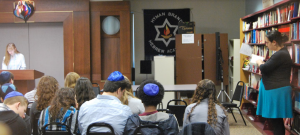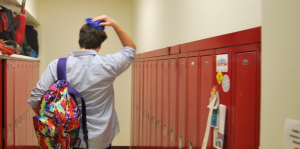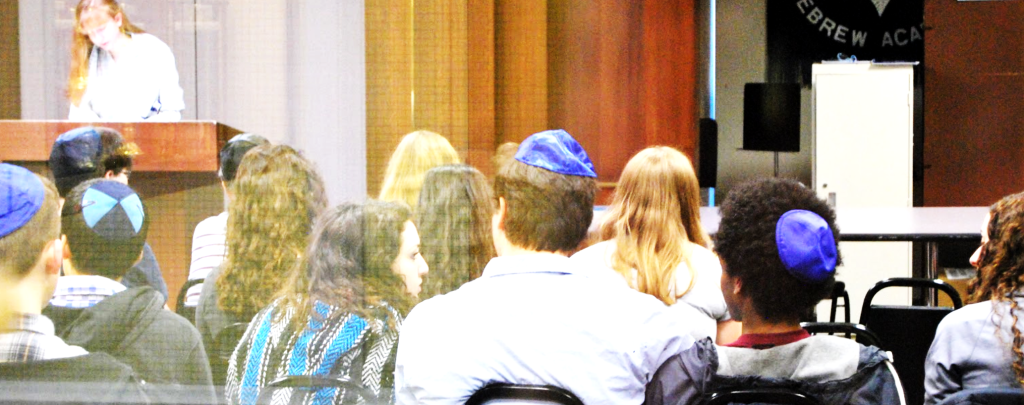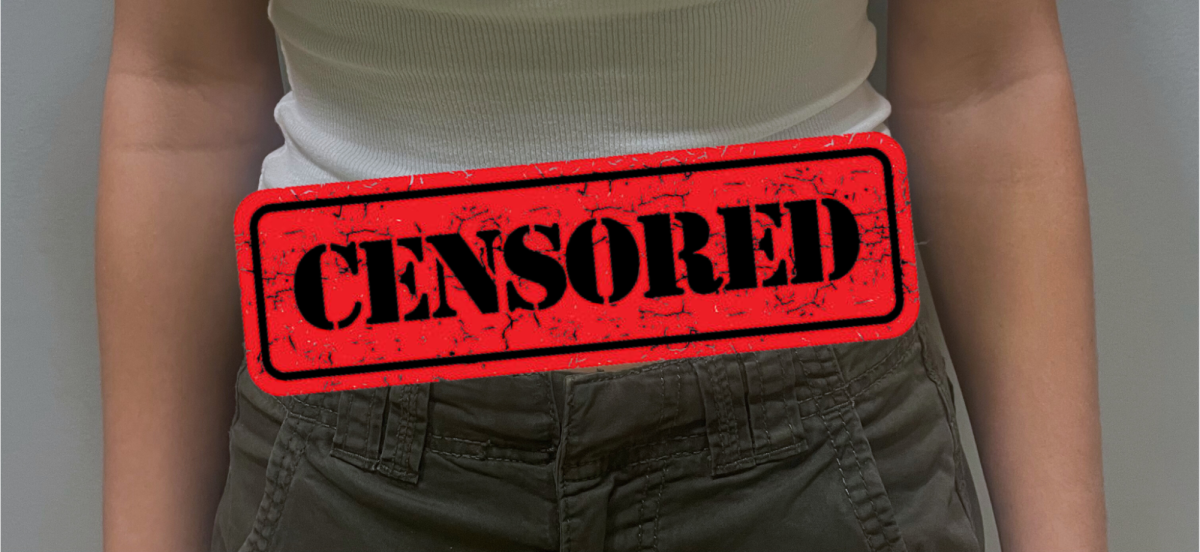In my 11 years at HBHA, it has become clear that the teachers and administrators put forth significant effort to help each student grow. As a pluralistic Jewish school, there are many opportunities for all of us to explore our individual identities as Jews. HBHA also maintains several Judaic requirements for graduation such as taking Jewish Studies classes, attending prayers every morning, and wearing a kippah (which is only required for boys). While each requirement has the potential to be incredibly meaningful, some of the strict regulations have become more burdensome than encouraging.
Understanding the Rules
In tefillah (morning prayers), participating, reading Torah, and leading the service constitute 10% of a student’s grade in their Judaics class, which is part of HBHA’s high school report card and the student’s Grade Point Average.
Zohar Flacks, Director of Jewish Life and tefillah mentor, explains that “the grading of participation goes to two points. One: how much [the students] talk, and disturb, and distract during prayer… And the other part is how much you participate in the call-and-response prayers.”
According to the current dress code, “Boys are expected to wear kippot during the school day, in Talmid, and at all school sponsored activities. No other headgear is allowed.” Regarding modesty, the dress code states, “Clothing should not be so tight or revealing or too loose as to conflict with the image HBHA wishes to project… The final decision whether attire is inappropriate, offensive, or distracting rests with the faculty and administration.” While not completely a Judaic issue, many rules in the high school dress code are rooted in the Jewish custom of tzniut- modesty.
Understanding the Controversy
As I have begun to explore my own identity as a Jew by culture and heritage who does not believe in a god, I have realized that I seldom connect to traditional prayers. Though I fundamentally disagree with most of the words of the prayers, I do feel connected when the community is enthusiastic and close. Having a teacher standing there, watching me, trying to make me say even a couple prayers is belittling, and it makes it more difficult to connect to the service. At the beginning of the school year, I tried to cope with this situation by sitting silently, tutoring a middle-schooler during tefillah, or even occasionally hiding a Jewish philosophy book inside my siddur and reading it rather than praying. One of my camp counselors told me about how she attended mandatory prayers at an Orthodox school, and she was able to reason with her teachers to let her read or sit silently instead of participate in prayer. At a pluralistic school, I figured, a similar leniency should be attainable. After bringing the issue up to my friends, I realized that this desire for leniency was surprisingly common.
While the participation grade itself is rarely significant enough to change a student’s grade in their Judaic class, many dislike the way it is enforced during tefillah.
Josh Kriesler, a freshman, explains that “if we’re forced to do something, it’s wrong to expect us to actually be enthusiastic about it.”
Kelly Reichman, the self-titled former “prayer police” (tefillah monitor), points out that the regulations are effective and sometimes necessary. “It’s not that hard to keep your mouth shut, and it’s respectful. You should never get below an A in prayer.” The students I interviewed all agreed that it is completely understandable to be penalized for being disrespectful during prayers, but that the “prayer-policing” is too harsh.
Sophomore Eliana Schuster says that she understands the rules but dislikes how they are regulated. “I think that the fact that we have to say prayers that some of us don’t believe is unfortunate, but, because it’s a school setting, I think it’s understandable… The part that irritates me the most is that we’re called out during the prayers, which is annoying because they want us to contribute, and then they’re taking away from the meaningfulness of the prayers because they’re yelling at us to pray, or to be quiet, or slow down.”

Another student, who asks to remain anonymous, said: “I think that they use participation grades as motivation for us to actually pray, but there’s something fundamentally wrong with forcing a person to pray… I feel very connected to my Judaism. When I want to pray, I have a great connection, but when I don’t want to, I feel like I’m getting graded on my connection, and it feels like a punch in the face- it’s just dumb.”
I decided to make a petition calling for a reform of the current rules for participation in prayers. I figured that if most of the students agreed that being policed during prayers wasn’t okay, maybe we could make a change in the regulations. As I was writing it, some of my friends asked me to add a section regarding the kippah requirement.
“I was about to take my anatomy final,” Justin Pfau, a senior at HBHA, told me, “and a teacher noticed I wasn’t wearing a kippah, [because] I forgot. In the middle of the final I had to go get a kippah and come back….. It was quite annoying, I missed probably a good five minutes of the final.” Another student was recently counted tardy after he missed the beginning of prayers because he was sent out of the room to retrieve a kippah.
Senior Zach Kriesler explains that he enjoys wearing a kippah, and feels connected to the custom. “I personally don’t mind it,” he adds, “but I do think It should be up to each individual to choose how they want to express their Judaism.” Sophomore Eliana Schuster adds that “to force students to wear a kippah is not okay for a school setting or even a Judaic setting. The only way that wearing a kippah will help someone connect to that tradition is if they choose to wear a kippah.”

The petition also contains a short section expanding on dress code regulations, other than kippot. Since last year, students have been trying to work with the administration to change some of the rules. Though some rules became more lenient as a result of those conversations, many rules in the dress code handbook are still vague or confusing. In addition, I have personally witnessed a significant increase in the number of students being “dress-coded” (being written-up or given a verbal warning for wearing something deemed too short, tight, or revealing). I have heard teachers say things like “if I can see it, the boys can see it” regarding an “immodest” outfit. Dress code has been an ongoing and heated issue, but the administration has been open to new suggestions.
After drafting and editing a page-long petition addressing the issues with the current prayer grades, kippah regulations, and specified/adapted dress-code rules, I began to collect signatures. I wanted to get as much support as possible with the hopes of improving the situation, but I made sure that every student read the petition completely before signing. In fact, several students only signed for one or two of the three sections. After a week, I approached every student in the high school. Out of 41 students, 39 had signed.
Taking Action
I arranged to meet with Flacks and Rabbi Weinstein, the head of the Jewish Studies department, to formally present the petition and discuss potential changes to the rules. I hoped the petition would get my message across: Students are eager to try to connect to these practices, but forcing traditions upon them is burdensome and strains their connections.
Unfortunately, my petition encountered immediate resistance. Each argument I presented was met with overwhelmingly negative objections, such as my lack of “Jewish arguments” rather than “western” ones, my lack of understanding and surplus of skepticism, and the assertion (regarding the kippah issue) that “if the boys have got a complaint, I’d like to hear it from them… because it’s their problem, and not yours.” Rabbi Weinstein and Flacks also tried to help me better understand their perspectives on the topics.
Rabbi Weinstein explained that several years ago, the participation grades in prayer were put into place because “an adult would come from the outside community [into HBHA tefillah], and it would be embarrassing for the school, because the behavior was so horrific.”
Flacks added, “the only time [the students] are being called out for not praying is during the call- and-response prayers. That is the only time, and honestly, even if you don’t connect, those are the times that you are there for the community.”
“On the one hand,” Rabbi Weinstein continued, “forcing someone to daven [pray] when they don’t feel it is the height of hypocrisy, right? Yes- if it’s only about them. If it’s about a communal experience, where participation actually helps the individual’s experience, we have a responsibility beyond counting in a minyan to make it a pleasant experience for someone else.”
He gave similar reasoning for the kippah requirement. “It is an indication of identity, for the community at large– that people walk in and see kids wearing the kippot and they know right away that this school is different… We’re almost like a sanctuary, because we are very proudly a Jewish place.”
Even for the modesty aspects of the dress code, the root of the issue seems clear; participating in prayer, wearing a kippah, and dressing modestly are all meant to create a better Jewish environment for the whole school. On one side, we need to make sure that anyone could walk into the school and feel comfortable with the religious customs. On the other hand, we need to make sure that each student has the freedom to follow their own levels of comfort regarding these traditions. I do not think we have found the right balance. Though the goal of creating an enthusiastic Jewish environment is admirable, it will not be achieved if the traditions are too forced to be authentic. If 39 out of 41 upper school students want more freedom to choose how to follow these customs, it seems reasonable to at least try to make a change.
Soon, I hope to gather a group of students to finalize the amendments to the dress code that were drafted last year. Hopefully, with clearer rules and more student input, a new dress code handbook will be completed by the end of the semester.
Rabbi Weinstein still has complete jurisdiction for the kippah rule specifically, and after our meeting I think major changes are unlikely. “At worst, [wearing a kippah] is an inconvenience,” he said. “So for an inconvenience, we’re going to throw away a tradition that’s been here for 50 years? That’s a hard one for me.” While the rule itself will likely remain unchanged, Rabbi Weinstein expressed interest in expanding the qualifications of kippot to include baseball hats, which, if added to the rule, would be a welcome compromise.
The grading system in tefillah will likely continue to exist unaltered. The morning after I presented the petition, Flacks explained the grading system to the egalitarian prayer service members, emphasizing the importance of participation. Since then, daily participation has been asserted even more strongly. Flacks even implemented a new rule; signing out of prayers (to tutor or practice a torah reading) is no longer allowed on Mondays and Thursdays.
Though my efforts to accommodate less-observant Jews in prayers proved ultimately unsuccessful, I am still working to make tefillah more meaningful for myself and my peers. In the fall, I started a weekly guitar prayer service with Eliana Schuster. Curiously enough, this untraditional service elicits more enthusiastic participation than the regular service by far. When I am not leading “musical prayers” or excused from tefillah to tutor, you can find me sitting respectfully in silence somewhere in the egalitarian minyan, pondering the future of the universe and preparing to get points taken off my participation grade.
The views and opinions expressed in this article are those of the authors and do not necessarily reflect the position of HBHA’s student publication. The editorial student staff of the “Rampagewired” places the highest value on student-run journalism and responsible, free expression. The “Rampagewired” accepts unsolicited opinion pieces for its Op-Ed page from students, staff, and the community. Columns typically run 750 to 1,000 words in length. Those most likely to be published deal with timely and newsworthy issues in a well-reasoned, incisive, balanced, and compelling way, and, in the case of already well debated topics, they should present a new perspective. Contact: [email protected] or [email protected]
Oops! We stand corrected. The original version of this opinion piece did not conform to the “Rampagewired” stylesheet with regards to reference to rabbis. The “Rampagewired” departs from AP style and refers to rabbis at HBHA as Rabbi plus their last name in both the first and all subsequent mentions throughout an article. We apologize for this oversight, and the article has been corrected. -The Editors.















































































